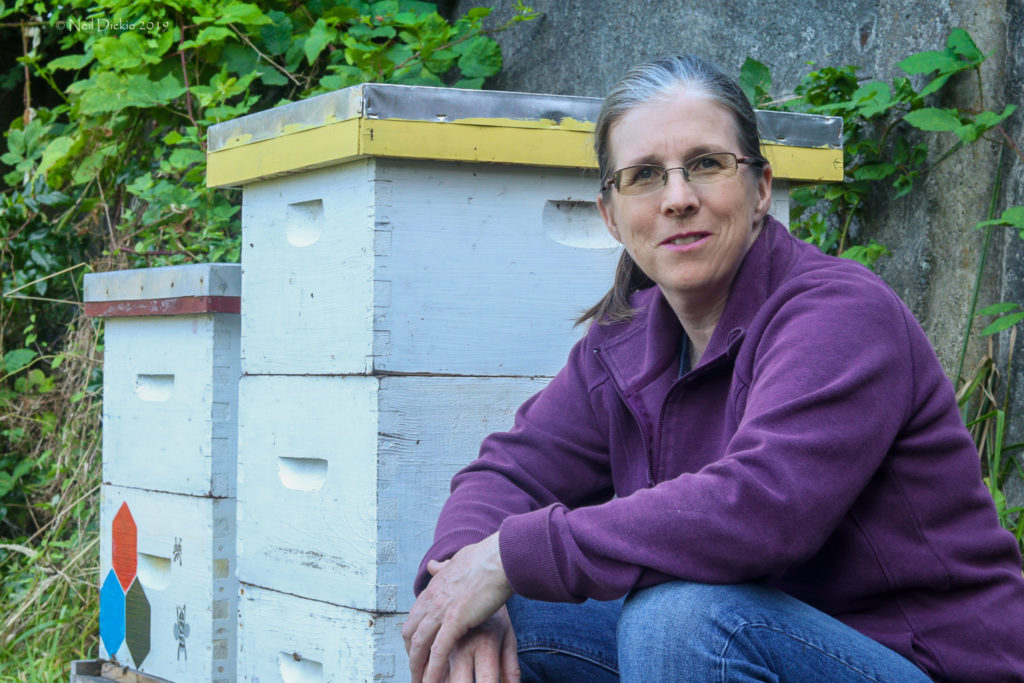Carolyn Hissen felt the call of volunteering from a young age. While she cites the Servers Guild at the Christ Church Anglican Church in Darthmouth, Nova Scotia, as her first foray into organized volunteering, Carolyn recalls offering her time as early as elementary school. Doing book orders for the classroom, working as a crossing guard and being a librarian helper some of the ways Carolyn gave back to her community at a young age.
These days Carolyn might best be known as the “bee lady”. Not only is Carolyn the second vice-president of the Capital Region Beekeepers Association, she’s also a volunteer beekeeper with the Friends of Government House Gardens Society. Carolyn manages a set of hives tucked away on the Estate of the Office of the Lieutenant Governor, the sprawling grounds surrounding Government House in Victoria. Carolyn’s bees, with their pollenating power, are an essential complement to the volunteer work of the Friends, who plan, maintain and cultivate the extensive and much acclaimed gardens.
“I really enjoy taking the time to talk to visitors to the gardens,” Carolyn says. “There’s so much interest in bees and how we can help them, so I almost always have long conversations with guests.” Sometimes visitors worry about getting in the way, but Carolyn relishes the chance to reach out. She recalls a time when two women, from a respectful distance, watched her reassemble a beehive after an inspection. Carolyn, forced to remove a piece of the hive, offered the fresh honeycomb to the women to eat. “They’d never had honey straight form the hive,” Carolyn remembers, “it was so wonderful to watch them experience something for the first time. I still remember how their faces lit up.”
Carolyn is especially inspired by the curiosity of children. Using beehives as tools for education, Carolyn prompts children to connect the work of bees to the thriving plants and gardens around them. In one instance, Carolyn collected a swarm of bees from a local school, which she moved to the Government House hives, creating a bond between herself, the bees, and the students of the school. Carolyn gave a presentation at a school assembly; students painted a hive to house the bees, and, later, came to visit the schoolyard swarm now safely ensconced at Government House.
It’s these kinds of connections that draw Carolyn to volunteering. “Volunteering builds bridges within a community,” Carolyn says. She advises those who are looking to get started with volunteer work to look for something they enjoy or are passionate about. For those intimidated or feeling like they’re lacking the right skill set, Carolyn assures us that enthusiasm or interest is a huge asset. “That passion spills over into other people’s lives and influences them,” Carolyn says. “By sharing our time with organizations, we can focus and combine our efforts to make a bigger change in our community.”
At home away from the bees where she fosters dogs, Carolyn can see how she’s a small piece of a much bigger project. While she acts as a pivotal person for the healing of her foster dogs, it’s the strength of all involved with the Humane Society that creates the foundation for her work. “With every group that I’ve been involved with, I’ve been able to make an impact,” Carolyn says, “but I never could have done it on my own.”
Learn more about Carolyn’s volunteer work:
Friends of Government House Gardens Society
The Friends of Government House Gardens Society was formed with the mission of undertaking the restoration and maintenance of the grounds of Government House. Originally a small group of garden volunteers, today the Society has a membership of almost five hundred, the majority of whom are volunteers working not only year round in the gardens, woodlands and associated non-gardening activities but also with the seasonal tearoom, costume museum and greeters.
Capital Region Beekeepers Association
The largest bee club on Vancouver Island, with over 200 active members, and meetings covering material for both new and experienced beekeepers.
Epiphyte Educational Society
Founded in 2020 by a group of parents and professional educators who believe in inquiry learning and whose children have benefited from inquiry learning.


